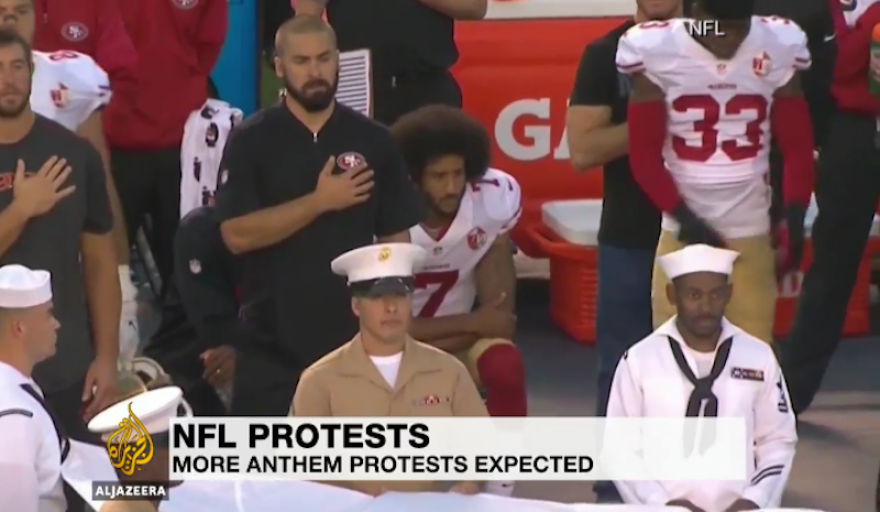This story has been updated since it originally aired in November of 2016.
For many people, this is a time to reflect on what it means to live in the United States. The election season revealed a divided nation, and many folks are saying they feel like strangers in their own country. Clearly, many already did.
One person who expressed that sentiment on the national stage is Colin Kaepernick, the quarterback of the San Francisco 49ers. Before a preseason game in August, 2016, he chose not to stand during the singing of the national anthem. He said it was a protest against police brutalizing people of color in the United States.
“Ultimately,” he said in a post-game press conference, “it’s to bring awareness and make people realize what’s really going on in this country. There are a lot of things that are going on that are unjust, people aren’t being held accountable for, and that’s something that needs to change. That’s something that this country stands for freedom, liberty, and justice for all, and it’s not happening for all right now.”
Kaepernick has embraced his role as a social justice spokesman.
Soon after, he hosted a camp in Oakland for underprivileged kids throughout the Bay Area. Inspired in part by the Black Panther Party, it drew more than 100 people who learned about education, finances, physical fitness and how to face oppression. Kaepernick told reporters he hopes to replicate the camp around the country.
“From top to bottom it was something myself, my woman, our friends, we came together, we put it together,” he said. “As far as curriculum, the event, everything. We wanted to make sure it was very grassroots, that it was true to what we believed, and the message wasn’t, you know, skewed or misrepresented or manipulated by a corporation that we had to stand behind.”
But then, Kaepernick chose not to vote in the Presidential election. In fact, it turns out he wasn't even registered to vote. That prompted a backlash from previous supporters like commentator Steven A. Smith on ESPN’s First Take.
“He absolutely betrayed his cause,” said Smith. “As far as I’m concerned, Colin Kaepernick is absolutely irrelevant. I don’t want to see him again. I don’t want to hear from him again. I don’t want to hear a damn word about anything he has to say about our nation, the issues that we have, racial injustices, needing change, etc. etc. He comes across as a flaming hypocrite.”
Kaepernick’s abstention even prompted a joke from comedian Dave Chappelle during his opening monologue for NBC’s Saturday Night Live.
“I’m staying out of it,” said Chappelle. “I’m just going to take a knee, like Kaepernick, and let the whites figure this out among themselves.”
Kaepernick had a football game to play the following Sunday. During the postgame press conference, he was asked about not voting.
“You know,” he said, “I think it would be hypocritical for me to vote. You know, I said from the beginning I was against oppression, I was against the system of oppression. I’m not going to show support for that system. And to me, the oppressor isn’t going to allow you to vote your way out of your oppression.”
Colin Kaepernick has invoked Malcolm X many times — from shirts bearing quotes attributed to the civil rights leader to a black baseball cap featuring a large white X. Malcolm X’s philosophies were complicated. You can hear that in one of the speeches he’s best known for, made in 1964. It’s called “The Ballot or the Bullet.” Malcolm X thought the Republican candidate for president, Barry Goldwater was racist. He called him “a wolf” — an obvious threat. But Malcolm X was also frustrated with the policies of the Democratic party under President Lyndon Johnson. He called Johnson “a fox” — a sneaky enemy. Whether by the fox or the wolf, Malcolm X said, black people would get eaten.
To a crowd gathered in Detroit in April, 1964, he said, “You can see that the Negro vote is the key factor. And despite the fact that you are in a position to be the determining factor, what do you get out of it? The Democrats have been in Washington D.C. only because of the Negro vote. They’ve been down there four years, and they're -- all other legislations they wanted to bring up they brought it up and gotten it out of the way, and now they bring up you. And now, they bring up you. You put them first, and they put you last 'cause you’re a chump.”
Still, Malcolm X told the crowd, it was important to be involved politically.
“We must understand the politics of our community,” he said, “and we must know what politics is supposed to produce. We must know what politics play in our lives. And until we become politically mature, we will always be misled, led astray, or deceived or maneuvered into supporting someone politically who doesn’t have the good of our community at heart.”
Ultimately, Malcolm X thought that if there was no candidate he believed in, he would not vote.
“Today,” he said, “our people can see that we’re faced with a government conspiracy. This government has failed us.”







